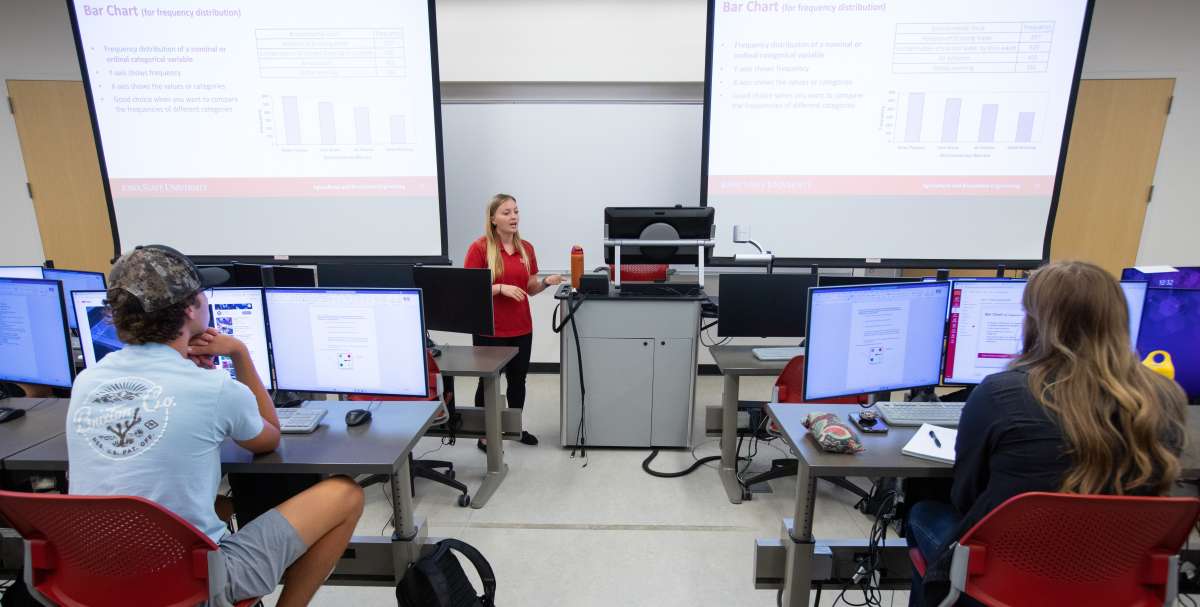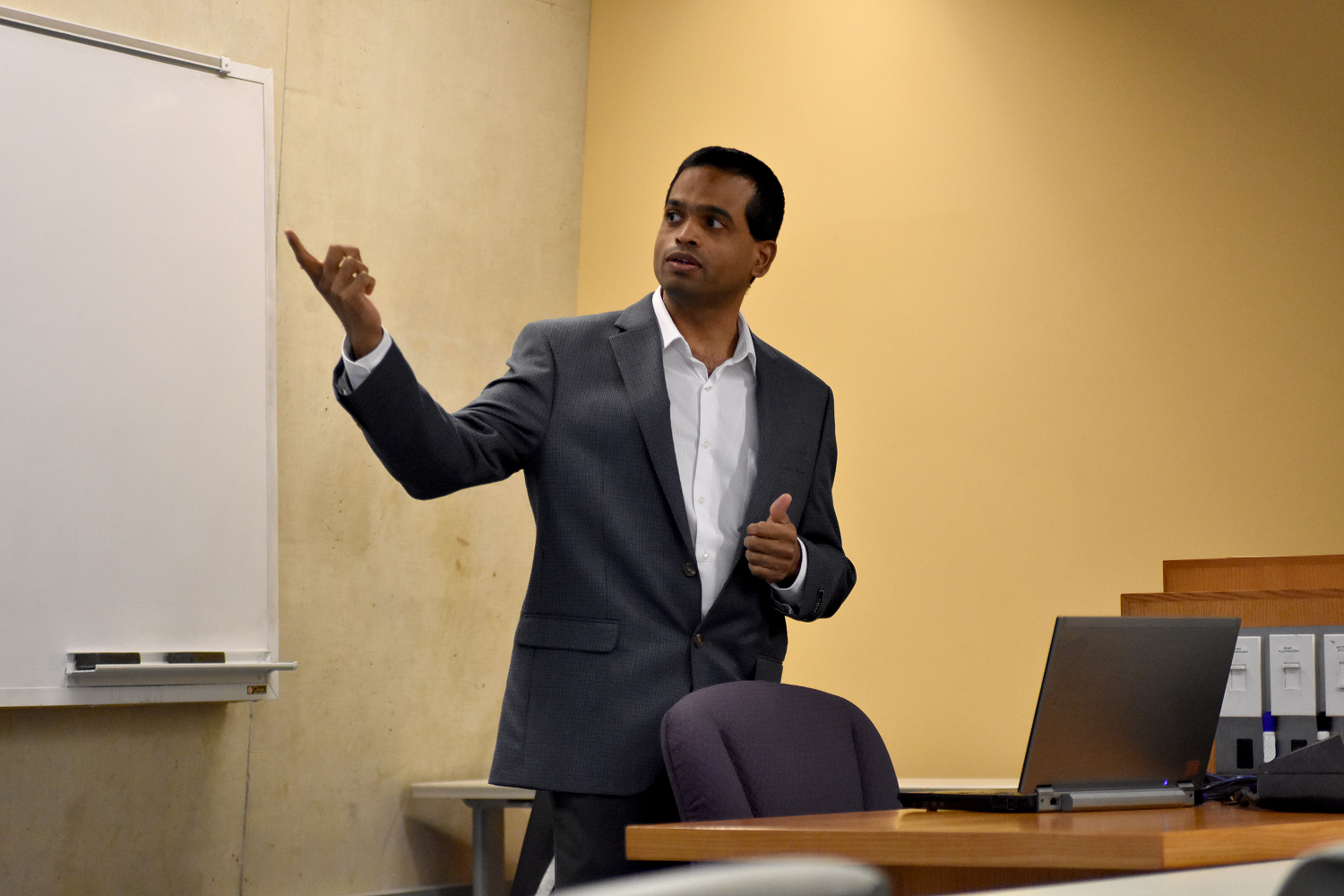Academic Careers
· Prepare for faculty careers
· Develop foundational teaching skills
· Create academic job application materials
· Earn certificates for your achievements
Teaching in English
· Develop English proficiency necessary for confident teaching
· Practice effective strategies for classroom communication
· Meet English requirement for ITAs
Mentorship
· Understand mentoring roles, styles, and practices
· Learn how to enact effective mentorship behaviors
· Find out how to support students and train new researchers
-

Teaching Assistant Training: Classroom Scenarios
If you’re new to teaching, or new to teaching at Iowa State, join us for Classroom Scenarios: Teaching Assistant Training. This training is offered the Thursday before classes start in both Fall and Spring semesters.
Though geared for an audience of teaching assistants, everyone interested in teaching in the Iowa State community is welcome to attend. Registration is required.

Preparing Future Faculty (PFF)
Preparing Future Faculty is a national movement sponsored by the Association of American Colleges and Universities and the Council of Graduate Schools.
The PFF program at ISU equips postdoctoral fellows, Ph.D. students, and master’s students with effective teaching skills, strategies, and experiences needed for successful academic careers. The program consists of four courses of 4 GR ST courses, each designed to cover a unique area or set of topics related to becoming a future faculty member. The first course is GR ST 5850 (fall only) and is followed by GR ST 5860 (spring only). The final two courses, GR ST 5870 and GR ST 5880 (all semesters) are arranged to fit cohort participants’ schedules. GR ST 5870 and GR ST 5880 can also be taken concurrently with other PFF courses.
Participation in PFF leads to certificate notations on the transcript, which increase competitiveness for faculty positions at a variety of institutions. Participants can also receive documentation for a portfolio or dossier and letters of recommendation from PFF mentors.
First Semester – GR ST 5850
Introductory Seminar: 2-credit course consisting of 15 two-hour panels and team workshops overviewing issues of faculty and student life including the hiring, promotion, and tenure processes and expectations at different institutions to identify fit in the academic landscape. Participants create/refine/polish vitae, cover letters, and research statements.
Second Semester – GR ST 5860
Intermediate Seminar: 3-credit course that meets two times each week for 90 minutes. Sessions focus on topics such as teaching statements, course design, interviewing skills, and effective pedagogical strategies. Participants update their 5850 job package with statements commonly requested by hiring committees (such as teaching or service statements), write a series of reflection journal responses, participate in learning teams, and develop course materials (e.g., syllabi, sample assignments, course activities, assessments, and evaluation rubrics) for a course they might teach as future faculty.
Third Semester – GR ST 5870
Teaching Practicum: 1-3 credit, individually arranged, teaching experience. Participants complete a stand-alone teaching experience accompanied by appropriate mentoring. The teaching experience may be traditional or web-based, but must be at least the equivalent of a 1-credit university course. Additional requirements include: weekly meetings with fellow GR ST 5870 classmates, observing a classmate’s teaching and having their teaching observed, and reflective writing assignments. Completed proposals for GR ST 5870 must be submitted to the PFF program director for approval before the semester begins.
Fourth Semester – GR ST 5880
Special Topics: 1-3 credit independent study providing academic professional development. Activities might include supervised reflective writing of a grant or journal article, extensive job shadowing at partner institutions, course or web development, participation in university or extension service responsibilities, etc. Additional requirements include: weekly meetings with the PFF director and other GR ST 5880 participants, frequent submissions of progress on the project, and reflective writing assignments. Completed proposals for GR ST 5880 must be submitted to the PFF program director for approval before the semester begins.
Levels of certification
To earn a certificate, participants must complete at least two courses. The certifications include:
- PFF Associate: completed GR ST 5850 and 5860
- PFF Fellow: completed GR ST 5850, 5860, and 5870 or 5880
- PFF Scholar: completed GR ST 5850, 5860, 5870, and 5880
To participate in the PFF program, you must be in at least the second year of a master’s or Ph.D. program at Iowa State or hold a postdoctoral appointment. If North American English is not your native language, you must satisfy the English for Teaching Requirement before beginning the PFF program.
To apply to the PFF program:
- Go to PD@ISU website and create a profile. For a how-to-use PD@ISU tutorial, scroll to the bottom of this page.
- Ask an ISU tenure-track faculty member to recommend you to PFF. Inform them an upload link will be sent to them after you have submitted your application.
- After creating your profile and asking a faculty member to serve as your recommender, complete three short essays in our online PFF application and attach your current CV.
The applications deadline is March 1, 2026 for Fall semester 2026 PFF enrollment. If you have missed this year's application deadline, please inquire if there are open spaces by emailing pff@iastate.edu
If you have previously applied to PFF, please edit and re-submit your application for the new application cycle.
PFF forms are available at and should be completed on the PD@ISU website.
Forms Required Every Semester
- Gr St 5850 Mentor-Mentee Agreement Form
- Gr St 5860 Mentor-Mentee Agreement Form
- Gr St 5870 Mentor-Mentee Agreement Form
- Gr St 5880 Mentor-Mentee Agreement Form
Participants Enrolled in GR ST 5860
- Gr St 5860 Signup Form
- Gr St 5860 Teaching Component Form
- Gr St 5860 Teaching Observation Agreement Form
Participants Enrolled in GR ST 5870 and 5880
- Increased practical teaching information and opportunities. PFF’s focus on teaching can give you the credentials and the confidence you need to face a competitive academic job market.
- Additional information on the balance of research, teaching, and service at various types of higher education institutions. This information can better prepare you to deal with the competing demands of a faculty position.
- Additional mentoring, with a tenure-track faculty member of your choice. PFF mentoring supplements the research mentoring you receive from your major professor and gives you the opportunity to build a new professional relationship.
- Seminars and workshops in such diverse topics as grant and proposal writing, intellectual property, learning styles, employment research, and promotion and tenure. This coursework can help you develop a more comprehensive view of today’s academic workplace.
- Current job search information. PFF provides speakers and other resources on the job search and critiques of your job letter and vita.
- Enhanced placement information. PFF gives you opportunities to interact with faculty and administrators from diverse institutions with different student populations and a wide range of institutional expectations to help you make decisions about the kind of institution that is right for you.
- A strong interdisciplinary professional network. The connections you make both with Iowa State PFF participants and at partner institutions can benefit you in your career.
Learn more about the Preparing Future Faculty (PFF) Program

English for Teaching Purposes
A series of sections of GR ST 5400 English for Teaching Purposes aims to prepare international graduate students for effective teaching in North American English.
Based on their results on the Oral English Certification Test (OECT), international teaching assistants can be placed in GR ST 5400, English for Teaching Purposes. GR ST 5400 courses can only be added to ITAs' schedules after taking the OECT. ITAs without OECT scores should email itas@iastate.edu to discuss options.
GR ST 5400 is also available to international graduate students who would like to pursue instructional opportunities at ISU in the future.
GR ST 5400, Section A
Low-Intermediate Spoken English: 3 Credits. The emphasis is on improvement in English pronunciation and fluency.
GR ST 5400, Section B/C
Intermediate Spoken English: 3 Credits. The emphasis is on the prosody of speech as well as on interactive oral communication.
GR ST 5400, Section D
Advanced Spoken English: 3 Credits. The emphasis is on presentation skills, developing explanations, leading discussions, and other language abilities essential in a teaching environment.
International teaching assistants who took the OECT should check their test scores in the OECT Portal and then register for the GRST 5400 based on the OECT recommendation in Workday.
International graduate students who did not take OECT should contact itas@iastate.edu for further instructions.

Oral English Certification Test (OECT)
The Oral English Certification Test (OECT) is required for international students with a teaching assistantship. This test assesses English language ability to communicate in everyday, academic, and classroom situations.
OECT results are used by academic departments and programs to make informed decisions when assigning teaching duties to their ITAs.
The OECT takes 20-25 minutes and consists of two sections:
- Oral Proficiency Interview (OPI)
- TEACH mini-lecture.
Both sections of the test are video/audio recorded.
Test takers must arrive at the check-in location one hour before their scheduled test time. For example, if the test appointment is at 10:40 am, the student is required to check in at 9:40 am to prepare for the TEACH part of OECT.
Test takers must also bring the following documents:
- University ID card (or another photo ID such as a driver's license or passport)
- Most recent official English language score report (e.g., TOEFL, IELTS or PTE Academic) and a digital copy of it (first-time test takers only). If students do not have an official score report available, they may present a printout of their TOEFL scores reported on the ETS website at their check-in.
- Students who have earned a bachelor's or higher degree in the U.S. do not need to present an English language score report, but they should send proof of their degree to lcompton@iastate.edu or present that at check-in on the test date. Proof of degree may include a copy of the diploma or a transcript with the earned degree and the student's name listed.
The OECT scores fall within 4 levels
Level 1 - Fully Certified
- Scores: The test-taker passed both the OPI and the TEACH tests with scores of 230 or higher (on a scale 0-300).
- Recommended teaching duties: Sole instructor or any other duty based on department needs, but some personal support for the TA in the first semester is recommended.
- English course required: None.
- Recommendations for extended practice: None.
Level 2 - Conditionally Certified
- Scores: The test-taker received (1) a score of 210 or 220 on one OECT component and a higher score on the other, or (2) scored 210 or 220 on both OPI and TEACH. For example, the test-taker passed the OPI test with 230, but received a score of 210 or 220 on TEACH.
- Recommended teaching duties: Recitation or discussion leader, occasional presenter, or any of the duties described in the lower levels.
- English course required: One semester of GR ST 5400, usually section D, which must be taken during or before the first semester of teaching duties.
- Recommendations for extended practice: Participation in one Peer Speaking Practice Group or participation in one individual speaking consultation at least bi-weekly for a full semester.
Level 3 - Certified with Restrictions
- Scores: The test-taker received a score of between 170 and 200 (1) on one OECT component and higher on the other or (2) on both OPI and TEACH.
- Recommended teaching duties: Laboratory instructor, help room tutor, or any of the duties described in the lowest level.
- English course required: 1-2 semesters of GR ST 5400, usually sections A-C (depending on scores), with retesting at the end of each semester. Classes must be taken during or before the first semester of teaching duties and continue for a second semester if still teaching, unless the student retests at Level 1.
- Recommendations for extended practice:
- Level 3, 190-200 scores: Participation in one Peer Speaking Practice Group or participation in one individual speaking consultation per week for a full semester.
- Level 3, 170-180 scores: Participation in two Peer Speaking Practice Groups ((separate months during the semester) or participation in one individual speaking consultation per week for a full semester.
Level 4 - Not Certified
- Scores: The test-taker received scores of below 170 on one OECT component or both OPI and TEACH.
- Recommended teaching duties: Duties that do not require spoken English proficiency, such as taking care of or setting up equipment, grading assignments, and proctoring examinations.
- English course required: 2-3 semesters of GR ST 5400, usually beginning with section A and finishing with section D, with retesting at the end of each semester. Classes must be taken during or before the first semester of teaching duties and continue the following semesters.
Learn more about OECT
Teaching Skills
What is it?
The ability to effectively measure/assess learning, deliver actionable feedback to support learning, and evaluate your own instruction is vital to teaching.
How to develop it?
As a teaching assistant learn to: adapt assessments, apply grading rubrics, deliver specific feedback, identify and address student errors, reflect on instruction, incorporate diverse assessments, encourage self-assessment, identify strengths and weaknesses, revise assignments/assessments, develop assessments to identify misconceptions, analyze assessment data, adjust instruction based on feedback, use formative and summative assessments strategically.
Why is it important?
Assessing, evaluating, and feedback are a foundation of effective teaching. They provide insights into student learning, inform instructional decisions, and ultimately enhance student achievement, thus creating an engaging and productive learning environment.
What is it?
Creating and implementing effective teaching strategies to promote student understanding and engagement through clear communication of course content and development of evidence-based instructional practices.
How to develop it?
Acquire subject matter knowledge, adapt instructional materials, communicate complex ideas clearly, facilitate student engagement, develop student-centered teaching skills, respond to student needs, refine communication skills, design materials aligned with learning outcomes, create student-centered syllabi, implement active learning strategies, implement Universal Design for Learning, teach transparently, vary teaching methods, write clear learning outcomes, assess teaching practices, use formative assessments, connect course content to broader discipline, revise course structure.
Why is it important?
Fundamental to successful teaching, enhancing student learning, engagement, and overall educational experience.
What is it?
A student-centered, well-managed learning environment is crucial for student success. Physical, social, and emotional conditions influence the teaching and learning process. Teachers play a vital role in creating and maintaining positive, productive, student-centered learning environments.
How to develop it?
Establish safety rules, create course structures that enable learning, interact professionally with students, organize physical space, use positive reinforcement, foster positive relationships, manage student interactions, maintain communication, plan effective lessons, solicit student feedback, implement inclusive policies, create a safe space for risk-taking, support diverse backgrounds, respond effectively to disruptive behavior.
Why is it important?
Crucial for student success, influencing the teaching and learning process and requiring teachers to create and maintain a positive, productive, student-centered learning environment.
What is it?
Mentoring learners in your research group or advising learners in their overall academic journey is part of teaching. Likewise, finding experienced teachers to mentor you as an instructor is vital to the continuous improvement of your teaching skills. Developing these skills can also help you with your coworking and networking suite of social skills useful in any work environment. Mentoring is an up, down, and across activity—advice and support can flow between student, peer, and advisor.
How to develop it?
Build rapport, create a safe space, show empathy, communicate regularly, recognize achievements, recommend opportunities, seek advice, arrange teaching observations, help students/peers formulate goals, model self-reflection, provide resources, guide individual development plans, model goal setting, offer continuous support, discuss and support academic changes, provide opportunities for individual development plans, model problem-solving, utilize evidence-based mentoring practices.
Why is it important?
Empowers students to navigate college life and make informed decisions, contributes to continuous improvement of teaching skills, and develops valuable social skills for various work environments.
